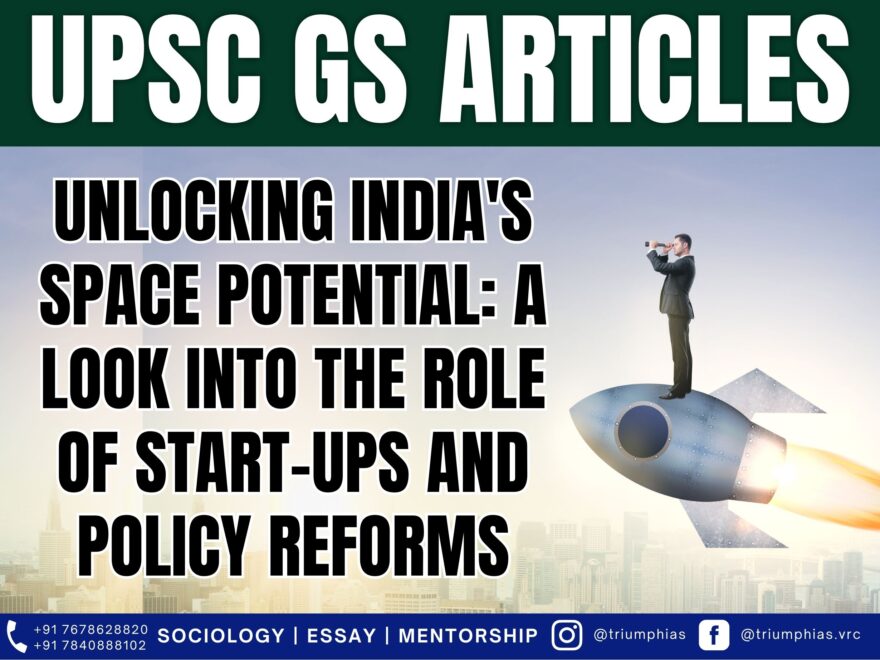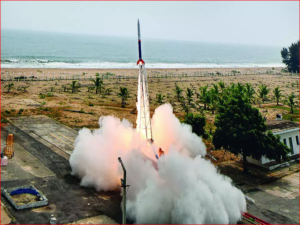India’s Space Potential
(Relevant for General Studies Paper Prelims/Mains)
(Hindu, Indian Express)

Space start-ups: A promising field to explore for space industry
The worldwide commercial space market holds a value of $360 billion and is projected to expand to a minimum of $500 billion by 2030. Government agencies and private-sector enterprises share a common goal of deploying satellites to meet various needs, spanning from internet broadband and entertainment distribution to climate surveillance and numerous location-based services.
Startup Ecosystem in IndiaAs of May 31, 2023, India has emerged as the third-largest hub for start-ups on a global scale. Furthermore, India holds the second position in terms of innovation quality, excelling particularly in the quality of its scientific publications and universities among middle-income economies. Over the period from 2015 to 2022, the Indian startup ecosystem has witnessed remarkable growth, including:
|
Government related initiatives
IN-SPACE: The inception of IN-SPACE aimed to create a level playing field for private enterprises, granting them equitable access to India’s space infrastructure.This initiative serves as a centralized conduit connecting ISRO with all entities interested in engaging in space-related ventures or harnessing India’s space assets.
NewSpace India Limited (NSIL): Unveiled in the 2019 Budget, NSIL was established with the objective of leveraging the research and development efforts undertaken by ISRO throughout its history, channeling them into commercial applications through collaborations with Indian industrial partners.
Need of development in the Space Sector
- Addressing Climate-Related Challenges: The advancement of space technology holds significant potential for bolstering connectivity and addressing climate-related issues through more secure and efficient means. Satellites play a pivotal role in providing precise weather forecasts, monitoring long-term climate trends, and assessing the habitability of regions. Furthermore, they serve as real-time monitoring and early-warning systems for natural disasters like earthquakes, tsunamis, floods, wildfires, and mining activities.
- Enhancing Connectivity: Satellite communication extends its reach to remote areas where traditional networks would necessitate extensive supplementary infrastructure. Consequently, investments in this domain are expected to yield positive ripple effects across various sectors.
- India’s Position in the Global Space Market: As of 2021, India ranked as the sixth-largest participant in the global space technology landscape, boasting 3.6% of the world’s space-tech companies. Notably, the United States dominates this sector, representing 56.4% of all space-tech firms. Other significant players include the United Kingdom (6.5%), Canada (5.3%), China (4.7%), and Germany (4.1%).
- India’s space industry, valued at $7 billion in 2019, aspires to reach $50 billion by 2024. A standout characteristic of India’s space endeavours is their cost-effectiveness. For instance, India achieved the remarkable feat of reaching Mars’ orbit on its maiden attempt, a mission that cost just $75 million, a significantly more budget-friendly accomplishment compared to Western standards.
Need of private sector participation for space industry
India’s space market currently holds a relatively modest share, valued at around $7 billion, despite the impressive capabilities developed by ISRO. However, private sector involvement is poised to bring about several key benefits:
a) It will facilitate the transformation of ISRO’s proven capabilities into viable business opportunities.
b) This participation is expected to significantly increase India’s market share to approximately $50 billion, which would represent around 10% of the global market by 2030.
c) It will allow ISRO to shift its focus toward research and development while outsourcing the manufacturing of components to private firms, adhering to specified standards.
d) It will facilitate the transfer of technology from ISRO to private entities.
e) Private companies will gain access to ISRO’s facilities for launches and testing, as exemplified by Skyroot.
Collectively, these developments will empower private enterprises to ascend the value chain, progressing from mere component suppliers to active players within the aerospace sector. Conversely, ISRO will be able to dedicate its resources to more complex endeavours, including the construction of larger rockets and satellites equipped with enhanced capacity and advanced capabilities.
Challenges for India’s Space Sector
- Reduced Budget Allocation: India’s space sector receives significantly less funding in comparison to other nations. In the 2019-20 fiscal year, the United States outspent India by a factor of 10, while China exceeded India’s spending by six fold.
- Lack of a Clear Legislative Framework: Despite the introduction of the draft Space Activities bill in 2017, it has yet to be ratified, leaving a legal void in the governance of space activities.
- Inadequate Dispute Resolution Mechanism: The absence of a robust mechanism for settling disputes dissuades private investments in the space sector. This deficiency was evident in the Antrix-Devas satellite deal’s cancellation, leading to the Indian government’s owing of nearly $1.2 billion to Devas Multimedia, as ordered by an International Chamber of Commerce tribunal.
- Brain Drain: India consistently produces some of the world’s brightest minds but struggles to retain them. A significant brain drain occurs as individuals emigrate in pursuit of better career opportunities, potentially impeding the space sector’s development.
- Management of Satellite Constellations: While India possesses substantial satellite launch capabilities, effectively managing a large number of satellites in space poses future challenges. Such management must consider the possibility of future space conflicts.
Need for Reforms in the Space Sector
- Expanding the Sector’s Scope: ISRO operates under central funding, with an annual budget of approximately Rs. 15,000 crore, primarily allocated to rocket and satellite construction. The Indian space economy remains relatively modest in size. To amplify the sector’s impact, it is essential to involve private enterprises. ISRO is strategizing the dissemination of knowledge and technology, encompassing rocket and satellite manufacturing, to engage private entities. Notably, countries like the United States, Europe, and Russia boast mature space industries featuring prominent players such as Boeing, SpaceX, AirBus, and Virgin Galactic.
- Revamping Private Sector Involvement: While private enterprises have traditionally played a role in the sector, their participation has primarily focused on manufacturing individual components and sub-systems. To invigorate the industry, efforts should be made to enable the complete production of rockets and satellites.
What can be done
- Swift Implementation of an Independent Tribunal: The establishment of an autonomous tribunal dedicated to resolving disputes among private space entities should be executed expeditiously.
- Enactment of the Space Activities Bill: To provide comprehensive clarity and safeguards to private participants, the Space Activities Bill should be passed into law. This should be accomplished through extensive consultations and dialogues involving all relevant stakeholders.
- Empowering Space Start-ups: The emphasis should be placed on supporting space start-ups in extending their reach to rural India, fostering an environment that encourages young talents to pursue careers in space applications and sciences.
- Transformation of NSIL’s Role: The National Space Innovation Labs (NSIL) should evolve beyond its role as a mere marketer of ISRO’s technologies. It should actively seek fresh business opportunities and contribute to the sector’s expansion.
- Augmented Investment Allocation: India should increase its investment in the space sector, considering its immense future potential and the substantial returns on investment it offers.
- Enhanced Collaboration and Research: The country should intensify collaborative research endeavours with leading nations like the United States and Russia, which have already demonstrated proficiency in managing extensive satellite constellations. Initiatives like Mission Shakti, designed to test anti-satellite weapons, can be instrumental in averting potential space conflicts.
Indian Space sector possesses huge untapped potential which can be realized with adequate policy measures by the government. This would boost the confidence of the private sector and deliver optimum results, thereby helping the country acquire the top spot in the global space industry.
Frequently Asked Questions:
-
Question: Discuss the role of private sector involvement in the development of India’s space industry.
Answer: Private sector involvement can transform ISRO’s capabilities into business opportunities, increase market share, and allow ISRO to focus on R&D. - Question: What challenges does India’s space sector face in terms of legislative framework?
Answer: The absence of a ratified Space Activities Bill creates a legal void that hampers the governance and private participation in India’s space activities. - Question: How is India positioned globally in terms of space technology companies?
Answer: As of 2021, India ranks as the sixth-largest participant in the global space technology landscape, holding 3.6% of the world’s space-tech companies. - Question: What impact does ‘Brain Drain’ have on India’s space sector?
Answer: Brain drain impedes the development of the space sector as highly skilled individuals emigrate for better career opportunities. -
Question: What role can policy measures play in shaping India’s future in the global space market?
Answer: Adequate policy measures like passing the Space Activities Bill and increasing investment can empower start-ups and attract private sector participation, thus helping India gain a top spot in the global space industry.
To master these intricacies and fare well in the Sociology Optional Syllabus, aspiring sociologists might benefit from guidance by the Best Sociology Optional Teacher and participation in the Best Sociology Optional Coaching. These avenues provide comprehensive assistance, ensuring a solid understanding of sociology’s diverse methodologies and techniques.
India’s Space Potential, Indian Space Sector, ISRO, Start-ups, Policy Reforms, IN-SPACE, NSIL, Private Sector Involvement, Space Industry Challenges, Future of Indian Space, Government Initiatives, indian space sector for private sector, india space sector upsc, space india space greens, indian space sector, Space Activities Bill

Why Vikash Ranjan’s Classes for Sociology?
Proper guidance and assistance are required to learn the skill of interlinking current happenings with the conventional topics. VIKASH RANJAN SIR at TRIUMPH IAS guides students according to the Recent Trends of UPSC, making him the Best Sociology Teacher for Sociology Optional UPSC.
At Triumph IAS, the Best Sociology Optional Coaching platform, we not only provide the best study material and applied classes for Sociology for IAS but also conduct regular assignments and class tests to assess candidates’ writing skills and understanding of the subject.
Choose The Best Sociology Optional Teacher for IAS Preparation?
At the beginning of the journey for Civil Services Examination preparation, many students face a pivotal decision – selecting their optional subject. Questions such as “which optional subject is the best?” and “which optional subject is the most scoring?” frequently come to mind. Choosing the right optional subject, like choosing the best sociology optional teacher, is a subjective yet vital step that requires a thoughtful decision based on facts. A misstep in this crucial decision can indeed prove disastrous.
Ever since the exam pattern was revamped in 2013, the UPSC has eliminated the need for a second optional subject. Now, candidates have to choose only one optional subject for the UPSC Mains, which has two papers of 250 marks each. One of the compelling choices for many has been the sociology optional. However, it’s strongly advised to decide on your optional subject for mains well ahead of time to get sufficient time to complete the syllabus. After all, most students score similarly in General Studies Papers; it’s the score in the optional subject & essay that contributes significantly to the final selection.
“A sound strategy does not rely solely on the popular
Opinion of toppers or famous YouTubers cum teachers.”
It requires understanding one’s ability, interest, and the relevance of the subject, not just for the exam but also for life in general. Hence, when selecting the best sociology teacher, one must consider the usefulness of sociology optional coaching in General Studies, Essay, and Personality Test.
The choice of the optional subject should be based on objective criteria, such as the nature, scope, and size of the syllabus, uniformity and stability in the question pattern, relevance of the syllabic content in daily life in society, and the availability of study material and guidance. For example, choosing the best sociology optional coaching can ensure access to top-quality study materials and experienced teachers. Always remember, the approach of the UPSC optional subject differs from your academic studies of subjects. Therefore, before settling for sociology optional, you need to analyze the syllabus, previous years’ pattern, subject requirements (be it ideal, visionary, numerical, conceptual theoretical), and your comfort level with the subject.
This decision marks a critical point in your UPSC – CSE journey, potentially determining your success in a career in IAS/Civil Services. Therefore, it’s crucial to choose wisely, whether it’s the optional subject or the best sociology optional teacher. Always base your decision on accurate facts, and never let your emotional biases guide your choices. After all, the search for the best sociology optional coaching is about finding the perfect fit for your unique academic needs and aspirations.
To master these intricacies and fare well in the Sociology Optional Syllabus, aspiring sociologists might benefit from guidance by the Best Sociology Optional Teacher and participation in the Best Sociology Optional Coaching. These avenues provide comprehensive assistance, ensuring a solid understanding of sociology’s diverse methodologies and techniques. Sociology, Social theory, Best Sociology Optional Teacher, Best Sociology Optional Coaching, Sociology Optional Syllabus.
Best Sociology Optional Teacher, Sociology Syllabus, Sociology Optional, Sociology Optional Coaching, Best Sociology Optional Coaching, Best Sociology Teacher, Sociology Course, Sociology Teacher, Sociology Foundation, Sociology Foundation Course, Sociology Optional UPSC, Sociology for IAS,
Follow us :
🔎 https://www.instagram.com/triumphias
🔎https://www.youtube.com/c/TriumphIAS
https://t.me/VikashRanjanSociology
Find More Blogs
|
Scope of the subject and comparison with other social sciences |
|||
|
|
|
|
Modernity and social changes in Europe |


